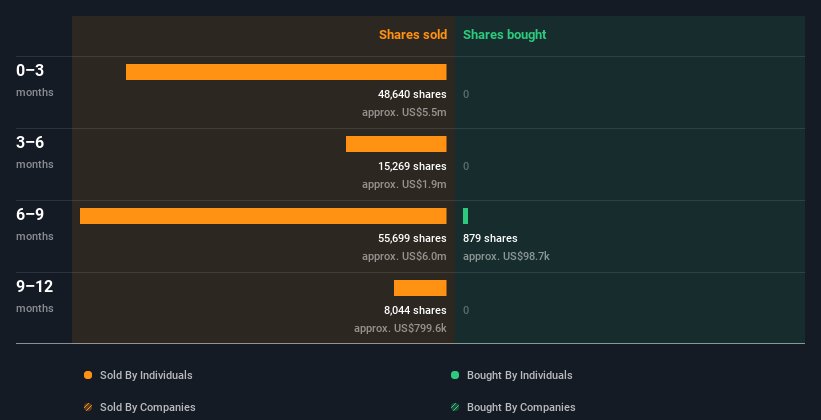- United States
- /
- Capital Markets
- /
- NYSE:RJF
Trade Alert: President & CEO of Raymond James & Associates Inc Broker/Dealer Of Raymond James Financial Tashtego Elwyn Has Sold Stock

Some Raymond James Financial, Inc. (NYSE:RJF) shareholders may be a little concerned to see that the President & CEO of Raymond James & Associates Inc Broker/Dealer, Tashtego Elwyn, recently sold a substantial US$3.4m worth of stock at a price of US$110 per share. That's a big disposal, and it decreased their holding size by 42%, which is notable but not too bad.
See our latest analysis for Raymond James Financial
The Last 12 Months Of Insider Transactions At Raymond James Financial
The Chairman & CEO, Paul Reilly, made the biggest insider sale in the last 12 months. That single transaction was for US$5.0m worth of shares at a price of US$104 each. That means that even when the share price was below the current price of US$115, an insider wanted to cash in some shares. When an insider sells below the current price, it suggests that they considered that lower price to be fair. That makes us wonder what they think of the (higher) recent valuation. Please do note, however, that sellers may have a variety of reasons for selling, so we don't know for sure what they think of the stock price. It is worth noting that this sale was only 15% of Paul Reilly's holding.
All up, insiders sold more shares in Raymond James Financial than they bought, over the last year. You can see a visual depiction of insider transactions (by companies and individuals) over the last 12 months, below. If you want to know exactly who sold, for how much, and when, simply click on the graph below!

If you like to buy stocks that insiders are buying, rather than selling, then you might just love this free list of companies. (Hint: Most of them are flying under the radar).
Does Raymond James Financial Boast High Insider Ownership?
I like to look at how many shares insiders own in a company, to help inform my view of how aligned they are with insiders. We usually like to see fairly high levels of insider ownership. Raymond James Financial insiders own 9.9% of the company, currently worth about US$2.3b based on the recent share price. Most shareholders would be happy to see this sort of insider ownership, since it suggests that management incentives are well aligned with other shareholders.
So What Do The Raymond James Financial Insider Transactions Indicate?
Insiders sold Raymond James Financial shares recently, but they didn't buy any. Despite some insider buying, the longer term picture doesn't make us feel much more positive. On the plus side, Raymond James Financial makes money, and is growing profits. It is good to see high insider ownership, but the insider selling leaves us cautious. While it's good to be aware of what's going on with the insider's ownership and transactions, we make sure to also consider what risks are facing a stock before making any investment decision. In terms of investment risks, we've identified 1 warning sign with Raymond James Financial and understanding it should be part of your investment process.
Of course, you might find a fantastic investment by looking elsewhere. So take a peek at this free list of interesting companies.
For the purposes of this article, insiders are those individuals who report their transactions to the relevant regulatory body. We currently account for open market transactions and private dispositions of direct interests only, but not derivative transactions or indirect interests.
New: AI Stock Screener & Alerts
Our new AI Stock Screener scans the market every day to uncover opportunities.
• Dividend Powerhouses (3%+ Yield)
• Undervalued Small Caps with Insider Buying
• High growth Tech and AI Companies
Or build your own from over 50 metrics.
Have feedback on this article? Concerned about the content? Get in touch with us directly. Alternatively, email editorial-team (at) simplywallst.com.
This article by Simply Wall St is general in nature. We provide commentary based on historical data and analyst forecasts only using an unbiased methodology and our articles are not intended to be financial advice. It does not constitute a recommendation to buy or sell any stock, and does not take account of your objectives, or your financial situation. We aim to bring you long-term focused analysis driven by fundamental data. Note that our analysis may not factor in the latest price-sensitive company announcements or qualitative material. Simply Wall St has no position in any stocks mentioned.
About NYSE:RJF
Raymond James Financial
A diversified financial services company, provides private client group, capital markets, asset management, banking, and other services to individuals, corporations, and municipalities in the United States, Canada, and Europe.
Undervalued with solid track record and pays a dividend.


